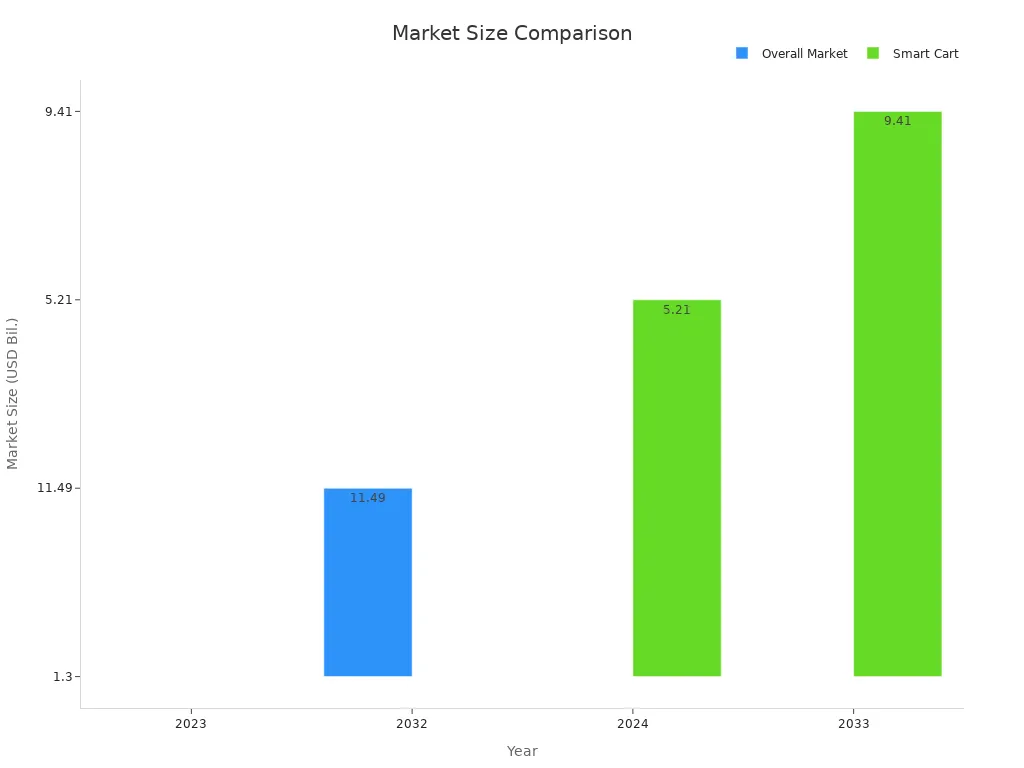Shopping Cart Manufacturers: Industry Leaders, Technologies, and Trends

Shopping cart manufacturers like Wanzl, NATIONAL CART, Unarco, and Cefla shape the global retail industry. The market for smart shopping carts reached USD 5.21 billion in 2024 and could grow to USD 9.41 billion by 2033.
Metric | Value/Description |
|---|---|
Market Size (2024) | USD 5.21 billion |
Projected Market Size (2033) | USD 9.41 billion |
CAGR (2024-2033) | 6.78% |
Leading Manufacturers | Wanzl, NATIONAL CART, Unarco, Cefla, Van Keulen Interieurbouw |

Ecommerce and online shopping drive new trends in commerce. AI-powered technology improves the shopping experience for every customer. Smart carts now feature image recognition, real-time billing, and eco-friendly designs. The retail sector uses these innovations to create better experiences and support sustainability. The retail industry continues to evolve as commerce, ecommerce, and shopping experiences change.
Key Takeaways
Leading shopping cart manufacturers like Wanzl, NATIONAL CART, and Unarco drive innovation with smart, durable, and ergonomic designs.
Smart shopping carts use AI, RFID, and sensors to improve real-time billing, inventory tracking, and customer experience.
Sustainability is a growing priority; many manufacturers use recycled and eco-friendly materials to meet customer demand.
Retailers should choose carts that fit their specific needs, support technology integration, and offer strong data security.
Ecommerce trends like voice shopping, AI recommendations, and contactless payments shape the future of retail shopping carts.
Industry Leaders
Shopping Cart Manufacturers
Shopping cart manufacturers play a vital role in shaping the retail industry. Companies like Sambo Corp, Unarco, Cefla, Versacart, Advance Carts, National Cart, Van Keulen Interieurbouw, Wanzl, Winleader, and Kailiou lead the market. Each company brings unique strengths and innovations to the table.
Sambo Corp stands out for its strong market share and focus on technological innovation. The company uses both primary and secondary data to track trends and improve its products. Sambo Corp responds quickly to changes in government policy and the market environment.
Unarco has a long history in the retail industry. The company invests in new designs and technology to meet the needs of modern stores. Unarco’s competitive position comes from its wide product range and strong financial performance.
Cefla is known for its advanced product outlook and key developments in the shopping cart space. Cefla’s growth comes from its ability to adapt to urbanization and the changing needs of the retail sector.
Versacart, Advance Carts, and National Cart also rank among the top shopping cart manufacturers. These companies focus on durability, customization, and smart cart features.
Wanzl and Van Keulen Interieurbouw have a global presence and offer a variety of solutions for different retail environments.
Winleader and Kailiou continue to expand their influence by adopting new materials and ergonomic designs.
Market intelligence reports provide detailed profiles, sales figures, and profit margins for these companies. The reports also analyze growth drivers such as retail sector expansion and improvements in design and technology.
Top Brands
The top brands in the shopping cart market include Versacart, Advance Carts, and National Cart. These companies have built strong reputations through innovation and quality.
Aspect | Versacart Systems, Inc. | Advance Carts, Inc. | NATIONAL CART |
|---|---|---|---|
Company Origin | U.S.-based | U.S.-based | U.S.-based |
Market Position | Top leader | Top leader | Top leader |
Product Offerings | Ergonomic, smart carts | Diverse solutions | Comprehensive retail carts |
Global Presence | International | International | International |
Strategic Initiatives | Innovation, smart carts | Durability, customization | Expanding retail partnerships |
Industry Trends Participation | Smart, ergonomic designs | Smart, ergonomic designs | Smart, ergonomic designs |
Versacart focuses on smart cart adoption and ergonomic designs. Advance Carts emphasizes durability and offers a wide range of solutions for the retail industry. National Cart works to expand partnerships and deliver comprehensive products for supermarkets and other retail spaces. All three brands operate internationally and participate in the latest industry trends.
Versacart, Advance Carts, and National Cart appear consistently among the top competitors in the global market.
These brands invest in product benchmarking and strategic planning.
Their company profiles highlight profitability, market strategies, and a strong regional footprint.
Market Reach
Shopping cart manufacturers reach markets around the world. Their influence extends across North America, Europe, Asia, and other regions. Each company adapts its products to meet local needs and consumer habits.
Shopping cart abandonment rates vary by region and culture. This shows that consumer expectations differ around the world.
Payment preferences also change from one region to another. Manufacturers must offer region-specific payment options to support the retail industry.
Mobile shopping dominates in some areas. Companies must optimize their carts for mobile use to reduce abandonment rates.
These regional differences push shopping cart manufacturers to create solutions that fit local markets. By understanding consumer behavior, they help the retail industry grow and adapt to new challenges.
Technologies in Shopping Carts

Materials
Shopping cart manufacturers use advanced materials to improve durability and safety. Stainless steel remains a popular choice because it resists rust and damage. Many companies now use lightweight plastics and composite materials. These materials make carts easier to push and help reduce maintenance costs. Some manufacturers add coatings that protect against germs and bacteria. This technology keeps carts cleaner and safer for shoppers.
Recycled plastics and metals have become more common in shopping cart production. These materials support sustainability goals and help reduce waste. Some companies use biodegradable plastics that break down faster in the environment. The use of sustainable materials shows how technology and design work together to create eco-friendly solutions.
Note: Retailers often choose materials based on local climate, store size, and customer needs. The right material can extend the life of a shopping cart and lower repair costs.
Smart Features
Modern shopping carts now include smart features that use the latest technology. Many carts have RFID tags that help track inventory and prevent theft. Some carts use sensors to collect data about how shoppers move through the store. This data helps retailers understand shopping patterns and improve store layouts.
AI-enabled technology powers features like automatic billing and image recognition. Shoppers can scan items as they place them in the cart. The cart then calculates the total cost in real time. Some smart carts connect to mobile apps, allowing shoppers to view promotions or find products faster. Anti-theft technology, such as wheel locks and alarms, protects carts from being stolen or taken outside store boundaries.
Retailers use diagnostic technology to monitor the condition of each cart. Sensors can detect when a cart needs repairs or cleaning. This data-driven approach helps stores keep carts in good working order and improves the shopping experience.
RFID tags track carts and products.
AI technology supports real-time billing and product recognition.
Sensors collect data for store optimization.
Anti-theft technology protects store assets.
Ergonomics
Ergonomic design plays a key role in shopping cart innovation. Studies show that handle design affects both comfort and sales. Vertical handles feel more comfortable for most users. However, parallel handles activate arm muscles and can increase sales across many product categories. This finding suggests that technology and design must balance user comfort with business goals.
Recent ergonomic assessments focus on elderly shoppers. Researchers use 3D simulation software and the NIOSH lifting equation to study how people use carts. They analyze handle height and basket size to reduce the risk of injury. These tools help designers create carts that fit a wide range of users. The process uses data from user studies and simulations to find the best dimensions.
Sustainable design also includes smart and assistive carts. Some carts use robotics to help people with physical challenges. These carts use technology to make shopping easier and safer for everyone. Designers use data from fuzzy evaluation methods and Miryoku engineering to match user needs with design features.
Tip: Retailers should consider both ergonomic comfort and sales impact when choosing shopping cart designs. Technology and data-driven research help create carts that work for all shoppers.
Trends in Retail and Shopping

E-commerce Integration
Ecommerce has changed the way people shop and how retail stores design their shopping carts. Online shopping and omnichannel retail now shape the features of modern carts. Voice commerce lets customers add items, check product availability, and place orders using voice commands. Many shoppers use Amazon Alexa, Google Assistant, Apple Siri, and Samsung Bixby for hands-free shopping. Retailers like Target, Walmart, and Instacart have added these features to improve the shopping experience. Samsung Bixby connects with Samsung Mall, allowing voice searches, price comparisons, and purchases. This technology makes shopping more interactive and efficient. Voice-enabled features help multitasking customers shop easily, increasing engagement and purchase frequency. Ecommerce platforms now use AI to offer personalized product recommendations, making the shopping experience faster and more convenient.
Voice commerce supports hands-free shopping and boosts customer engagement.
AI-driven ecommerce platforms provide personalized experiences and recommendations.
AI and Data Analytics
Artificial intelligence and data analytics drive many new shopping cart features. Retailers use data to understand customer behavior and improve the shopping experience. AI-powered bundling suggests products that go well together, increasing average order value. Targeted upsell offers recommend upgrades or premium versions at checkout. Big data analytics and machine learning track sales, demand, inventory, and marketing in real time. These tools help retailers make better decisions and manage stock efficiently. Conversational AI chatbots use natural language processing to help customers during checkout. Contextual search and AI recommendation engines use data to suggest related products, improving product discovery.
AI/Data Analytics Feature | Description | Impact on Shopping Cart Features | Example/Use Case |
|---|---|---|---|
AI-Powered Bundling | Analyzes buying behavior to suggest complementary products or personalized bundles. | Increases average order value by encouraging cross-selling. | Spotify uses recommendation systems for personalized playlists and bundles. |
Targeted Upsell Offers | Examines shopping carts and user profiles to recommend relevant upgrades or premium versions at checkout. | Enhances shopping experience and boosts revenue through upselling. | Uber suggests premium ride options and membership upgrades. |
Big Data Analytics & Machine Learning | Uses large datasets and ML to monitor sales, demand, marketing, inventory, and consumer behavior in real-time. | Enables data-driven decisions optimizing sales and inventory management. | Businesses use BI tools and ML to detect fake reviews and analyze social media sentiment. |
Conversational AI Chatbots & NLP | Employs natural language processing to engage customers, provide support, and assist during checkout. | Improves customer engagement and support, facilitating smoother checkout. | Chatbots deployed on messaging platforms like Facebook Messenger and WhatsApp. |
Contextual Search & AI Recommendation Engines | Uses contextual data (e.g., time, trends) to improve search precision and suggest related products. | Enhances product discovery and increases likelihood of purchase. | AI engines auto-fill search phrases and suggest relevant products. |
Retailers use these technologies to create personalized product recommendations and improve personalization and customer data analytics. This transformation leads to more cashier-less and efficient shopping experiences.
Sustainability
Sustainability has become a major trend in retail and ecommerce. Many shoppers now demand eco-friendly products and packaging. About 71% of shoppers choose products with sustainable packaging. Products with environmental, social, and governance claims have grown 28% in five years. The sustainable packaging market could double from $276 billion in 2023 to $558 billion by 2034. Europe leads with over 39% of the global market share, while Asia-Pacific’s market is growing quickly due to ecommerce and new regulations. In the U.S., 78% of shoppers want a sustainable lifestyle, especially younger customers. Over 63% of buyers prefer brands with public sustainability goals. Many consumers will not switch to cheaper options if it means losing sustainable packaging. Nearly half avoid products with too much packaging, and most prefer refillable options. About 50% are willing to pay more for sustainable food packaging.
Retailers and shopping cart manufacturers now use recycled materials and eco-friendly designs to meet customer demand and support sustainability goals. This shift reflects the growing importance of technology trends and digital transformation in commerce.
Comparison Table
Manufacturers vs. Technologies
Shopping cart manufacturers use different technologies to meet the needs of modern commerce and ecommerce. Some companies focus on smart features, while others invest in materials or ergonomic design. The table below shows how leading manufacturers compare in their use of new technologies.
Manufacturer | Smart Features (AI, RFID) | Sustainable Materials | Ergonomic Design | Digital Displays | Contactless Payment |
|---|---|---|---|---|---|
Wanzl | ✅ | ✅ | ✅ | ✅ | ✅ |
Winleader | ✅ | ✅ | ✅ | ✅ | ✅ |
Cefla | ✅ | ✅ | ✅ | ❌ | ✅ |
National Cart | ✅ | ✅ | ✅ | ❌ | ❌ |
Van Keulen Interieurbouw | ✅ | ✅ | ✅ | ❌ | ❌ |
Suzhou Hongyuan | ✅ | ✅ | ✅ | ✅ | ✅ |
Note: Leading manufacturers like Wanzl, Winleader, and Suzhou Hongyuan invest in research and development for AI, augmented reality, payment systems, and data analytics. These companies help shape the future of commerce and ecommerce by adopting the latest trends.
Trend Adoption
Manufacturers adopt new trends at different rates. Supermarkets lead adoption because they handle high transaction volumes and need efficient solutions for ecommerce and commerce. Asia-Pacific shows the fastest growth in adopting new technologies, driven by rising incomes and rapid advancements. Large shopping malls and supermarkets use smart carts more than smaller retailers.
Aspect | Summary |
|---|---|
Application Segment | Supermarkets and large malls adopt smart carts faster due to high ecommerce activity. |
Geographic Region | Asia-Pacific grows fastest in technology adoption for commerce and ecommerce. |
Manufacturer Innovation | Wanzl, Winleader, and Suzhou Hongyuan lead in AI, AR, and payment system integration. |
Adoption Barriers | High costs and IT needs slow adoption for small retailers in ecommerce and commerce. |
Market Concentration | Key players dominate, but smaller regional manufacturers also serve local ecommerce needs. |
Technological Trends | AI, AR, contactless payments, digital displays, and data analytics drive adoption. |
Challenges | Data privacy and integration issues affect ecommerce and commerce adoption rates. |
End-User Concentration | Supermarkets and malls are main users of advanced carts in ecommerce and commerce. |
Supermarkets and large malls use smart carts to improve ecommerce and in-store commerce.
Asia-Pacific leads in adopting new technologies for commerce and ecommerce.
High costs and IT needs can slow down adoption for smaller retailers.
Data privacy and integration remain important challenges for ecommerce and commerce.
Retailers who want to stay ahead in ecommerce and commerce should watch these trends. Manufacturers who invest in new technologies help shape the future of shopping.
Choosing Shopping Cart Manufacturers
Retail Needs
Retailers must understand their unique requirements before selecting a shopping cart manufacturer. Market research shows that retail needs differ between residential and commercial users. Residential users often look for convenience, lightweight carts, and compact designs. They prefer ergonomic features such as foldability and adjustable handles. Aesthetics also matter, as many customers want carts that match their lifestyle. Commercial users, on the other hand, focus on durability and high capacity. They need carts that can handle heavy loads and frequent use. Maintenance and cost-efficiency remain top priorities for these businesses. Many commercial retailers now seek carts with integrated technology, such as RFID tracking and smart compartments, to improve ecommerce operations and data collection. Demographic trends like urbanization and aging populations increase demand for ergonomic and space-saving carts. Retail infrastructure growth, including supermarkets and specialty stores, drives the need for durable, high-capacity carts. Sustainability also shapes customer demand, with many retailers choosing reusable carts made from eco-friendly materials.
Effective market research uses surveys and focus groups to gather data on customer preferences, satisfaction, and purchase motivations. This information helps retailers and manufacturers design products that meet specific retail needs.
Technology Fit
Selecting a shopping cart manufacturer requires careful evaluation of technology compatibility. Modern ecommerce environments demand seamless integration with payment processing, inventory management, and CRM platforms. Best practice reports highlight the importance of security compliance, fraud detection, and support for alternative payment methods. Retailers should look for carts that work well with existing systems and support AI-driven personalization. Integration with legacy systems can present challenges, so robust strategies such as middleware and standardized protocols help manage complexity. Security features like encryption and regular audits protect customer data and ensure safe transactions. Retailers must also consider hardware reliability and the ability to adapt to new ecommerce trends. Cross-functional collaboration between technology teams and business leaders ensures that smart cart solutions align with retail goals and customer service standards.
Practical Tips
When choosing a shopping cart manufacturer, retailers can follow these practical steps:
Assess Retail Needs: Identify whether the primary users are residential or commercial. Consider capacity, durability, and ergonomic features.
Evaluate Technology Integration: Check if the carts support ecommerce functions such as RFID, AI, and real-time data collection.
Prioritize Data Security: Ensure the manufacturer provides strong data protection and compliance with industry standards.
Review Customer Service: Choose manufacturers known for responsive service and support.
Consider Sustainability: Select carts made from eco-friendly materials to meet customer demand for sustainable products.
Test for Compatibility: Request product demos to verify integration with existing retail systems and ecommerce platforms.
Analyze Total Cost: Factor in maintenance, repair, and long-term value, not just the initial purchase price.
Retailers who follow these steps can select shopping cart manufacturers that meet their ecommerce, technology, and customer service needs, ensuring a better experience for both staff and shoppers.
Shopping cart manufacturers drive innovation in retail and ecommerce. Leading companies use AI, AR, and predictive analytics to improve the shopping experience and help retailers make better decisions.
Major retailers use ecommerce tools like voice shopping, mobile commerce, and AR to personalize the customer journey.
Sustainability and ethical practices shape customer choices and give retailers an advantage.
Technology transforms shopping by enabling self-checkout, buy-online-pick-up-in-store, and real-time inventory management. Retail professionals should consider both current innovations and future trends when choosing solutions for ecommerce and retail.
FAQ
What are the main benefits of using smart carts in ecommerce?
Smart carts help retailers track inventory and improve checkout speed. They also collect data for better ecommerce decisions. These carts can connect with mobile apps, making the shopping process easier for every customer.
How do shopping cart manufacturers support ecommerce growth?
Manufacturers design carts that work with ecommerce systems. They add features like RFID, digital displays, and contactless payment. These tools help stores manage online orders and in-store pickups, making ecommerce more efficient.
Why is sustainability important in ecommerce shopping carts?
Sustainability matters because many customers want eco-friendly products. Manufacturers use recycled materials and energy-saving designs. This helps ecommerce brands meet customer demand and protect the environment.
What role does data security play in ecommerce shopping carts?
Data security protects customer information during ecommerce transactions. Manufacturers add encryption and regular security checks. These steps keep payment and personal data safe for every customer.
How do shopping carts improve the ecommerce experience for customers?
Modern carts offer real-time billing, product recommendations, and easy navigation. These features help customers shop faster and find what they need. Ecommerce stores use these tools to create a better shopping journey.
See Also
Revolutionizing Online Store Management With AI E-Commerce Tools
Discovering Vending Machines’ Key Features And Modern Advantages
Understanding The Growth Of AI-Driven Corner Stores Today
